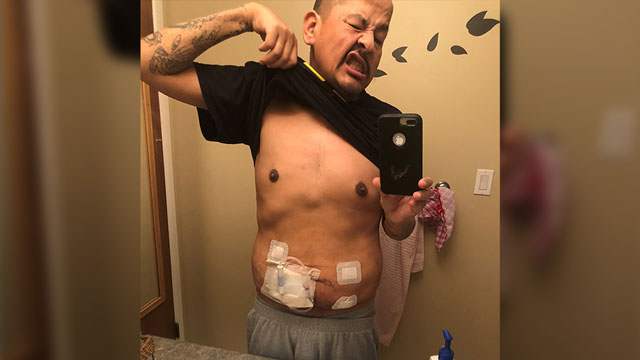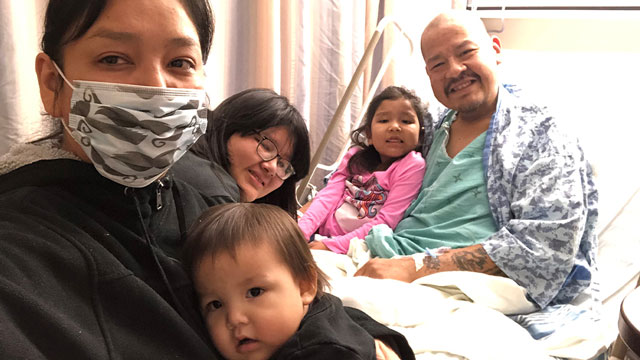A Cree rapper who goes by the name Hellnback is now using his decades of performing experience to educate others about kidney disease.
Karmen Omeasoo, 40, was staying in Pimicikamak Cree Nation in northern Manitoba last July when he had to visit the nursing station after having trouble breathing.
“[Nurses] called me the next day. They were frantic about everything and when I went there they were basically telling me that I had stage five kidney failure,” Omeasoo told APTN News.
The news came as a shock.
Omeasoo was diagnosed with Type 2 Diabetes when he was 19, but he never considered it would lead to kidney disease.
“It really snuck up on me. [Nurses] were really worried about my health but at the time I felt normal,” he recalled.
The life of a musician meant a healthy lifestyle was pushed to the side. This included constant touring, a poor diet and, at times, hard partying.
“The cause for my kidney failure was actually neglect to my diabetes,” said Omeasoo.
(‘It really snuck up on me,’ says Omeasoo. ‘[Nurses] were really worried about my health but at the time I felt normal.’ Submitted photo)
Kidneys help the body get rid of extra fluid, waste or minerals, according to the Manitoba Renal Program, which provides services for kidney care across the province.
When they stop working the body can’t get rid of the excess fluids and materials it doesn’t need. This can lead to sickness.
“Kidneys are very much a bystander. They’re innocent bystanders of everything else that goes on…and diabetes is one of the underlying problems that causes harm to the kidneys,” said Dr. Mauro Verrelli who is the medical director for the program.
March is National Kidney Month across the continent.
Every year organizations raise awareness about kidney health and kidney disease prevention.
The team at the Manitoba Renal Program (MRP) are working to emphasize different prevention and treatment methods.
“The things we identify early on in the course of kidney disease are generally treatable with simple medications, simple manoeuvres that we describe with healthy living,” said Verrelli.
“You don’t need to have a specialist to do that.”
However, once a patient hits stage five of kidney disease the only treatment available is dialysis or a kidney transplant, according to the MRP.
There are two forms of dialysis: peritoneal or hemodialysis.
The MRP’s website describes peritoneal dialysis as, “placing a catheter into the peritoneal cavity in the patient’s belly. Using the catheter, the peritoneal cavity is filled with clear fluid (called dialysate). Over time the fluid put into your body will collect waste. This waste fluid is then drained through the catheter before fresh fluid is put in again. This is called a PD exchange.”
The hemodialysis version is when blood is cleaned outside of the body using a machine and artificial kidney filter. This can be done at home or in hospital.
Omeasoo opted for the peritoneal option due to his career and family obligations. He went for surgery in November. He has to self-administer the dialysis treatment four times a day for 30 minutes.
(‘Kidneys are very much a bystander,’ says Dr. Mauro Verrelli of the Manitoba Renal Program. Submitted photo)
Manitoba has the highest rates of end stage kidney disease in Canada at 24 per cent higher than the Canadian average, according to a 2018 Canadian Institute for Health Information report.
The MRP estimates 1 in 10 people in Manitoba are living with kidney disease.
The Indigenous population are diagnosed with end stage kidney disease at higher rates than non-Indigenous in Canada, according to a 2016 report from the Canadian Agency for Drugs and Technologies in Health. The report notes in 2015, rates of end stage kidney disease are four times higher in Indigenous Canadians than in the general Canadian population.
Indigenous patients account for approximately 30 per cent of hemodialysis patients in Manitoba, the report states.
This has been linked to diet, access to health services and genetics.
Omeasoo credits his wife fellow musician Lisa Muswagon, family and fans for getting him through the treatments.
He is currently operating at five per cent kidney function and is scheduled for a kidney transplant in May.
Until then, he is continuing to advocate for more education and outreach in communities.
“Kidney health was the last thing on my mind, so I would love to see a lot more awareness, people talking about it more candidly, people talking about it more openly,” said Omeasoo.











